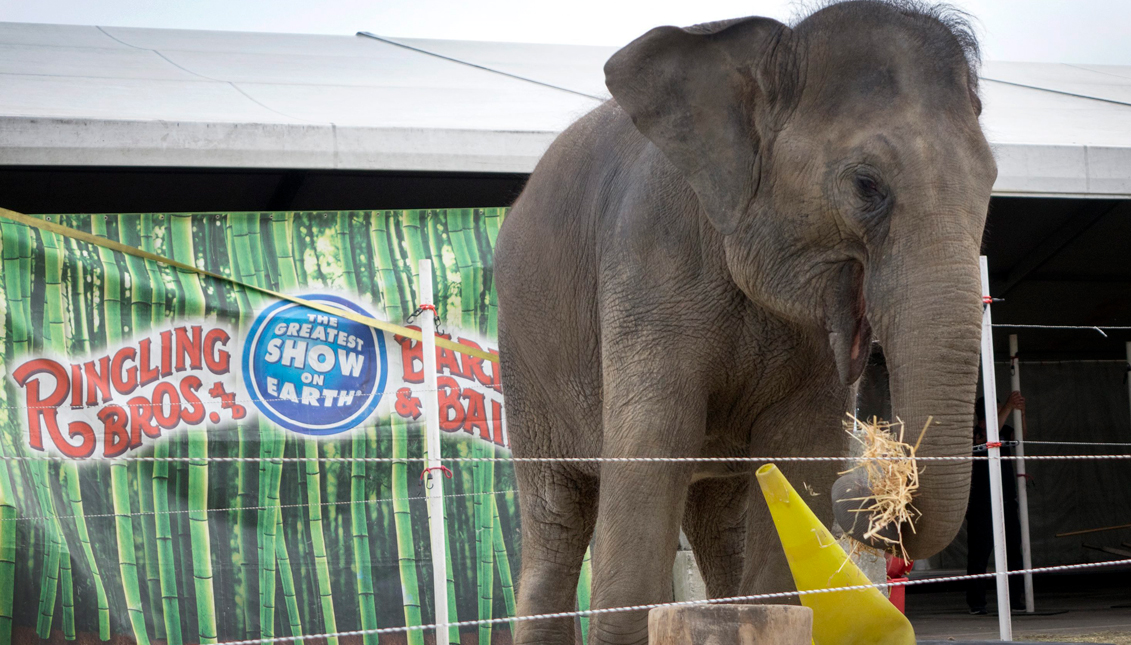
[OP-ED]: As the circus leaves town for good, may the increased respect for animals endure
I will never get to take my grandchildren to the circus.
MORE IN THIS SECTION
I will never get to take my grandchildren to the circus.
For that matter, I’ll never again get to take my parents -- who adore going with their own grandchildren to the circus for the cotton candy, popcorn, acrobats and animals -- now that Feld Entertainment has announced that, after 146 years, Ringling Bros. and Barnum & Bailey will close in May after a few final performances.
In its press release, Feld said that “high costs coupled with a decline in ticket sales” made the circus an unsustainable business for the company. “Following the transition of the elephants off the circus, the company saw a decline in ticket sales greater than could have been anticipated.”
This was surprising to me. In November 2015 I had taken my family to see one of the last performances that included the elephants and at the time felt that the spectacle of jugglers, contortionists, gymnasts and dancers had enough going for it that it didn’t need the elephants.
“Based on my observations, adults’ nostalgia will be the only thing hurt with fewer animals at the circus,” I wrote. “As I sat surrounded by babies, toddlers and young children, it was obvious that the animal attention was driven by parents and grandparents yelling ‘Look at the elephants! or ‘Look at the camels!’ in their kids’ ears.”
Boy, was I wrong. It seems that nostalgia was paying the bills for the multimillion-dollar circus productions that became unprofitable in a marketplace that now includes high-quality touring productions like Cirque du Soleil and Shen Yun Performing Arts, which both offer fantastical music and movement shows. And, of course, other Feld Entertainment events like Marvel Universe Live and Disney On Ice, which are geared toward young children, have been shearing audiences from the circus for years.
As sad as it is to see the circus go, the reason why it’s ending is a genuinely good one.
You’re only a Google search away from an avalanche of heartbreaking facts about how poorly the performance animals, especially the giant elephants, lived in even under the best of circumstances.
If more people truly understood what circus animals go through behind the scenes -- hours in close confinement, loud and uncomfortable railroad travel, grueling and sometimes cruel training -- in order to delight our families for a few hours on a Sunday afternoon, I bet it would soothe their sense of loss.
With so many alternatives for making magical family memories, I’m not going to worry about outings with future grandchildren. In fact, this turn of events has me hoping that someday there won’t be zoos or aquariums to take future grandkids to, either.
I’ve never liked these attractions. In my mind, containing wild animals for public display, even in the name of science or conservation, is a tragedy that becomes magnified over time as research continues to inform us on the deep cognitive and emotional intelligence even the simplest animals possess.
In the aftermath of the shooting death of the gorilla Harambe at the Cincinnati Zoo last year, Barbara King, a biological anthropologist and author of “Personalities on the Plate: The Lives and Minds of Animals We Eat,” remarked on “The Diane Rehm Show”: “We know many, many zoos are letting their elephants go to sanctuary. This is the kind of conversation that I think we do need to be having. These animals are very smart and they feel their lives as well as think their lives. ... I think the larger question is, how do we manage animals like this, when we know that more and more they have such incredible abilities to use tools to make emotional attachments, to really need a great deal of freedom to express their natural behaviors and their natural personalities?”
It’s a fair consideration -- and these are questions that come almost exclusively from people privileged enough to have gotten to see tigers, whales, elephants and other exotic animals only because there were institutions dedicated to making them available to the public.
But with advances in video documentary, virtual reality and other currently unimagined scenarios, there must surely, someday, be better ways to get masses face to face with our most precious creatures without ruining the quality of their lives for our entertainment.
Rest in peace Ringling Bros. and Barnum & Bailey -- may your demise touch off new standards of respect for animals everywhere.







LEAVE A COMMENT:
Join the discussion! Leave a comment.